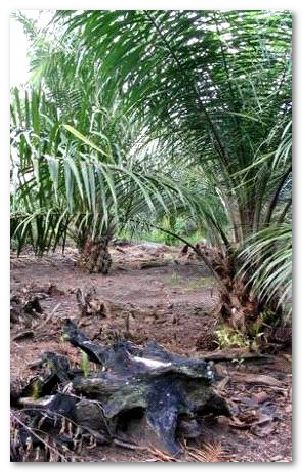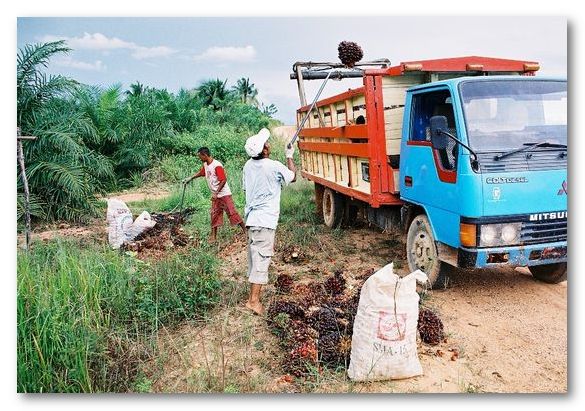Afrizal
Small farmers often lose out when they deal with big plantationsJudith Mayer |
Oil palm plantations were first established in what is now Indonesia in 1911. But total oil palm plantation areas have increased dramatically since 1998, covering over 6.1 million hectares by 2006, concentrated in Sumatra and Kalimantan. This makes Indonesia the world’s largest producer of palm oil, with Malaysia a close second. Together, the two countries are responsible for over 80 per cent of global production. Government plans call for expanding oil palm areas to some 20 million hectares by 2020.
In West Sumatra and Riau, local people have opposed nearly all palm oil companies’ operations through collective action. Many communities have organised protests which call on local governments to defend community members’ rights to land taken over by palm oil companies. Protests began in the early 1980s, when local officials were cooperating with companies to compel communities to relinquish land for plantation development. Under pressure, protests subsided or were effectively suppressed for over a decade, but have mushroomed since President Suharto resigned in mid-1998. Many conflicts have festered for years.
Local people strategise collectively in their struggle to defend land rights. They protest, make demands, and express their disappointment and anger directly to palm oil companies and to local officials
Local people strategise collectively in their struggle to defend land rights. They protest, make demands, and express their disappointment and anger directly to palm oil companies and to local officials, including district heads (bupati) and regional legislatures. They send letters and seek to discuss grievances with company managers and government officials. In both West Sumatra and Riau, public demonstrations are frequent. Protesters block company access to specific plots of land or to entire plantations. When their peaceful efforts are not successful, some protestors have destroyed companies’ plantation trees, and attacked plantation equipment or buildings.
Land rights overlooked
Protests have focused on three sets of concerns. These are demands for land compensation, defence of rights to specific plots of land, and demands that companies fulfill their promises to provide smallholders with oil palm plots as part of larger plantation schemes (these small plots are called ‘plasma gardens’, kebun plasma, a term which derives from the state-promoted ‘nucleus estate’ plantation model introduced in the 1980s, under which smallholders in the ‘plasma’ would cooperate with the large company in the ‘nucleus’).
Local people in West Sumatra and Riau have protested to palm oil plantation companies demanding fulfillment of siliah jariah – a local Minangkabau term for compensation that is paid by an ‘outside’ party for temporary use of land owned communally under Minangkabau customary rights, or for communal improvements (such as irrigation works made to land). Siliah jariah is different than what Indonesian agrarian law commonly refers to as ganti rugi (compensation for loss of rights to land or other private property) because siliah jariah does not imply transfer of ownership, and is usually paid to a community, rather than to an individual owner. Oil palm companies often fail to pay this compensation for communal land improvements before they clear and plant a plot of land. According to my recent research in West Sumatra and in Kampar District in Riau, local government land alienation committees rarely identified the customary requirement for siliah jariah payments when they acquired and transferred control of land for plantation development during the 1980s. Company managers have also rarely recognised the political importance of these payments.
Community members have argued that the companies cleared and planted oil palms on their customary land without asking their consent beforehand
Local people have also tried to defend their rights to specific land areas that plantation companies have taken over, including land that they consider to be private property under local customary rights. Community members have argued that the companies cleared and planted oil palms on their customary land without asking their consent beforehand.
In West Sumatra, such accusations usually involve small plots of land within or adjacent to the large ‘nucleus’ plantations concession areas that local leaders have provided to plantation companies. In Riau, by contrast, communities have challenged palm oil companies over their control of huge areas, some of them as large as 1000 to 7000 hectares. Many of these areas were former logging concessions that local government reallocated to palm oil plantation companies, some of which are actually owned by the same companies that controlled the former timber concessions. News media reported at least five of these cases in 2007 alone, but research by JS Mundung (from the Riau chapter of the environmental organisation Walhi) and a number of other activists identified at least 20 similar cases from 2003 to 2007. One example is in Kuala Cenaku Village (Kuala Cenaku subdistrict, Indragiri Hulu district), where a palm oil plantation company used 6420 hectares of land that had been a former timber concession owned by the same parent company.
Broken promises
 |
Indonesia is now the largest producer of palm oilJudith Mayer |
Local people have also protested against the conditions they have encountered when they participate as smallholders in the large nucleus estate schemes. These schemes promised participating households eventual legal title to small oil palm plots (the so-called plasma gardens) that were linked to the large ‘nucleus’ corporate plantations. Often these promises were made in exchange for land that local customary owners provided to the companies, either directly or through local governments.
However, in both West Sumatra and Riau, the promised smallholder plasma plots have rarely been planted, much less turned over to the local customary owners who released land to the plantations. Instead, companies have concentrated on working their own nucleus estates. In some cases, such as oil palm companies PT. AMP and PT. PHP, both operating in West Pasaman, West Sumatra, companies actually planted smallholder plots and the trees on them began to yield crops, but the companies retained the plots rather than handing them over to project participants as promised. The farmers demonstrated, and asked district and subdistrict officials to resolve the situation. In many other cases, the plantation companies did not bother to develop the smallholder plots at all.
Cause for hope
Some conflicts have been resolved. In West Sumatra, in response to local protests, some palm oil plantation companies have provided monetary compensation to local people whose land they had taken over without owners’ prior consent, thereby recognising the land as customary rights property belonging to local people.
In Riau, however, local people have been less successful in getting companies to return their land, or to pay them adequate monetary compensation for it. The problem in Riau is that neither palm oil companies nor local governments have recognised local customary rights and therefore deny that the disputed land rightfully belongs to members of local communities. So far, NGO activists in Riau (such as Walhi and ScaleUp) have not effectively focused attention on such failures to recognise customary property rights and it seems that local people in this province still face a long struggle to gain recognition as the customary owners of their land.
The most difficult problem to be resolved concerns local people’s demands for smallholder ‘plasma’ allotments, as promised to them by state-licensed nucleus estate programs. In many cases, local people who have released their customary land for plantation development have waited years for companies to develop plasma plots and transfer them back to original landowners.
In Riau local people have been less successful in getting companies to return their land, or to pay them adequate monetary compensation for it
Companies in Riau give several justifications for their reluctance to act. Some companies claim it is the district government’s responsibility to organise smallholder plots, not the company’s. Some insist that they will only hand over land if farmer cooperatives are formed by proposed plasma plot recipients, as required in the original negotiations. In response, farmers insist that the cooperatives have been formed, and lists of members given to local governments.
In 2008, managers of the plantations companies PT AMP and PHP argued that there was not enough land available to provide plots for all proposed recipients, and demanded that kinship group leaders (ninik mamak) find more land themselves! But it was extremely difficult for the customary leaders to do so, because very little communal land remains after the nucleus estates have taken so much of it. Some companies that have actually planted the plasma plots, including AMP, have introduced a supposedly temporary solution to compensate customary rights land owners whose land they took. Instead of transferring control of promised plasma plots to the farmers to whom they were promised, AMP paid each household a monthly fee of Rp. 150,000 beginning in 2002, increasing to Rp. 300,000 in 2008. However, these payments altogether amount to only about Rp. 90 million (US$9,300) per month in 2008, a minuscule sum when compared to the company’s profits from the plantation.
Persistent conflicts between local people and oil palm plantation companies must be resolved to the satisfaction of both local people and companies. To negotiate solutions, local governments have established committees with representatives of district and sub-district officials, companies, local police and military, and village leaders. Such committees have recommended that the precise locations and boundaries of companies’ nucleus estate lands be clarified and mapped. More contentiously, committees have usually recommended that companies finally develop the smallholder plasma plots and cede them to local farmers as promised.
The companies typically complain that they cannot find enough available land apart from that already tied up in their own nucleus plantations, and the committees have refused to demand that companies release nucleus land to smallholders. Overall, it appears that these committees have been unable to resolve local people’s conflicts with palm oil companies.
The companies typically complain that they cannot find enough available land apart from that already tied up in their own nucleus plantations, and the committees have refused to demand that companies release nucleus land to smallholders
Mediation strategies bringing together local people and company management could be one alternative approach, if credible mediators could be found. Local government committees could act in this role. Alternatively, appropriate local NGOs could act as mediators if all parties accepted them. Since 2004, Scale Up, a NGO based in Pekanbaru, has been quite successful in mediating resolutions of conflicts concerning plasma allocations in Riau.
Fully implementing new principles and criteria adopted by the Roundtable on Sustainable Palm Oil (RSPO) – an international initiative involving palm oil producers, NGOs and other stakeholders – might help resolve these problems for smallholders. The RSPO certifies palm oil producers based on both their environmental and social practices. To be certified, companies must demonstrate that plantation expansion has not required recent destruction of primary forest. They also must show that, if land has been provided for a plantation under state leases, customary land owners have provided free, prior, and informed consent. RSPO certification also requires oil palm producers to demonstrate that they have resolved conflicts with local people. These are noble aims. But how long will the small farmers and customary landowners of Riau and West Sumatra have to wait to see them realised? ii
Afrizal (afrizal_2002au@yahoo.com) is a senior lecturer in the Department of Sociology, Faculty of Social and Political Sciences, Andalas University. He holds a Ph.D. from Flinders University, and has investigated oil palm development and conflicts in Riau and West Sumatra. His recent research includes The Nagari Community, Business and the State: The Origin and the Process of Contemporary Agrarian Protests in West Sumatra, published by the Forest Peoples Programme and Sawit Watch (Bogor, 2007)
